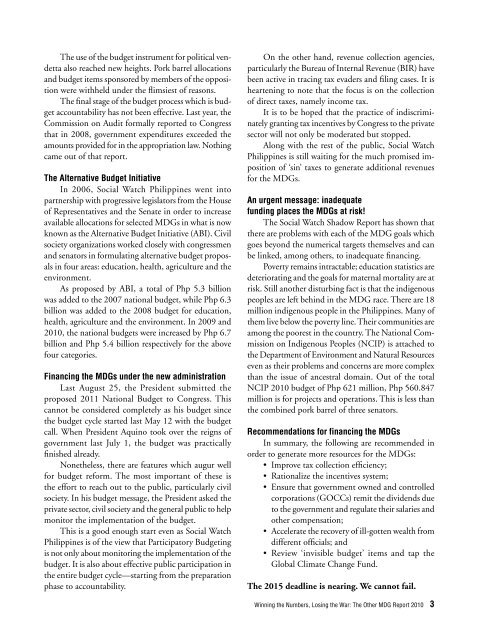Report - Social Watch Philippines
Report - Social Watch Philippines
Report - Social Watch Philippines
You also want an ePaper? Increase the reach of your titles
YUMPU automatically turns print PDFs into web optimized ePapers that Google loves.
The use of the budget instrument for political vendetta<br />
also reached new heights. Pork barrel allocations<br />
and budget items sponsored by members of the opposition<br />
were withheld under the fl imsiest of reasons.<br />
The fi nal stage of the budget process which is budget<br />
accountability has not been effective. Last year, the<br />
Commission on Audit formally reported to Congress<br />
that in 2008, government expenditures exceeded the<br />
amounts provided for in the appropriation law. Nothing<br />
came out of that report.<br />
The Alternative Budget Initiative<br />
In 2006, <strong>Social</strong> <strong>Watch</strong> <strong>Philippines</strong> went into<br />
partnership with progressive legislators from the House<br />
of Representatives and the Senate in order to increase<br />
available allocations for selected MDGs in what is now<br />
known as the Alternative Budget Initiative (ABI). Civil<br />
society organizations worked closely with congressmen<br />
and senators in formulating alternative budget proposals<br />
in four areas: education, health, agriculture and the<br />
environment.<br />
As proposed by ABI, a total of Php 5.3 billion<br />
was added to the 2007 national budget, while Php 6.3<br />
billion was added to the 2008 budget for education,<br />
health, agriculture and the environment. In 2009 and<br />
2010, the national budgets were increased by Php 6.7<br />
billion and Php 5.4 billion respectively for the above<br />
four categories.<br />
Financing the MDGs under the new administration<br />
Last August 25, the President submitted the<br />
proposed 2011 National Budget to Congress. This<br />
cannot be considered completely as his budget since<br />
the budget cycle started last May 12 with the budget<br />
call. When President Aquino took over the reigns of<br />
government last July 1, the budget was practically<br />
fi nished already.<br />
Nonetheless, there are features which augur well<br />
for budget reform. The most important of these is<br />
the effort to reach out to the public, particularly civil<br />
society. In his budget message, the President asked the<br />
private sector, civil society and the general public to help<br />
monitor the implementation of the budget.<br />
This is a good enough start even as <strong>Social</strong> <strong>Watch</strong><br />
<strong>Philippines</strong> is of the view that Participatory Budgeting<br />
is not only about monitoring the implementation of the<br />
budget. It is also about effective public participation in<br />
the entire budget cycle—starting from the preparation<br />
phase to accountability.<br />
On the other hand, revenue collection agencies,<br />
particularly the Bureau of Internal Revenue (BIR) have<br />
been active in tracing tax evaders and fi ling cases. It is<br />
heartening to note that the focus is on the collection<br />
of direct taxes, namely income tax.<br />
It is to be hoped that the practice of indiscriminately<br />
granting tax incentives by Congress to the private<br />
sector will not only be moderated but stopped.<br />
Along with the rest of the public, <strong>Social</strong> <strong>Watch</strong><br />
<strong>Philippines</strong> is still waiting for the much promised imposition<br />
of ‘sin’ taxes to generate additional revenues<br />
for the MDGs.<br />
An urgent message: inadequate<br />
funding places the MDGs at risk!<br />
The <strong>Social</strong> <strong>Watch</strong> Shadow <strong>Report</strong> has shown that<br />
there are problems with each of the MDG goals which<br />
goes beyond the numerical targets themselves and can<br />
be linked, among others, to inadequate fi nancing.<br />
Poverty remains intractable; education statistics are<br />
deteriorating and the goals for maternal mortality are at<br />
risk. Still another disturbing fact is that the indigenous<br />
peoples are left behind in the MDG race. There are 18<br />
million indigenous people in the <strong>Philippines</strong>. Many of<br />
them live below the poverty line. Their communities are<br />
among the poorest in the country. The National Commission<br />
on Indigenous Peoples (NCIP) is attached to<br />
the Department of Environment and Natural Resources<br />
even as their problems and concerns are more complex<br />
than the issue of ancestral domain. Out of the total<br />
NCIP 2010 budget of Php 621 million, Php 560.847<br />
million is for projects and operations. This is less than<br />
the combined pork barrel of three senators.<br />
Recommendations for financing the MDGs<br />
In summary, the following are recommended in<br />
order to generate more resources for the MDGs:<br />
Improve tax collection effi ciency;<br />
Rationalize the incentives system;<br />
Ensure that government owned and controlled<br />
corporations (GOCCs) remit the dividends due<br />
to the government and regulate their salaries and<br />
other compensation;<br />
Accelerate the recovery of ill-gotten wealth from<br />
different offi cials; and<br />
Review ‘invisible budget’ items and tap the<br />
Global Climate Change Fund.<br />
The 2015 deadline is nearing. We cannot fail.<br />
Winning the Numbers, Losing the War: The Other MDG <strong>Report</strong> 2010 3


